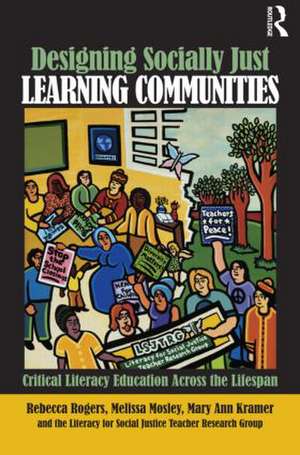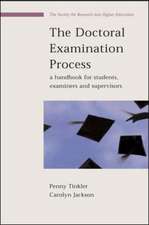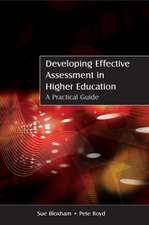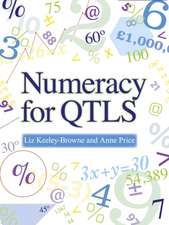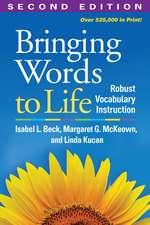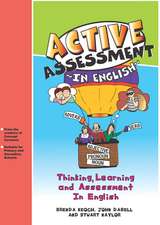Designing Socially Just Learning Communities: Critical Literacy Education across the Lifespan
Autor Rebecca Rogers, Mary Ann Kramer, Melissa Mosley, The Literacy for Social Justice Teacher Research Groupen Limba Engleză Paperback – 6 mar 2009
Designing Socially Just Learning Communities models an innovative form of professional development for educators and researchers who are seeking ways to transform educational practices. The teachers' practices and actions – in their classrooms and as members of the teacher research group – will speak loudly to policy-makers, researchers, and activists who wish to work alongside them.
| Toate formatele și edițiile | Preț | Express |
|---|---|---|
| Paperback (1) | 402.98 lei 6-8 săpt. | |
| Taylor & Francis – 6 mar 2009 | 402.98 lei 6-8 săpt. | |
| Hardback (1) | 1114.98 lei 6-8 săpt. | |
| Taylor & Francis – 6 mar 2009 | 1114.98 lei 6-8 săpt. |
Preț: 402.98 lei
Nou
Puncte Express: 604
Preț estimativ în valută:
77.11€ • 82.46$ • 64.29£
77.11€ • 82.46$ • 64.29£
Carte tipărită la comandă
Livrare economică 18 aprilie-02 mai
Preluare comenzi: 021 569.72.76
Specificații
ISBN-13: 9780415997621
ISBN-10: 0415997623
Pagini: 248
Dimensiuni: 152 x 229 x 15 mm
Greutate: 0.46 kg
Ediția:1
Editura: Taylor & Francis
Colecția Routledge
Locul publicării:Oxford, United Kingdom
ISBN-10: 0415997623
Pagini: 248
Dimensiuni: 152 x 229 x 15 mm
Greutate: 0.46 kg
Ediția:1
Editura: Taylor & Francis
Colecția Routledge
Locul publicării:Oxford, United Kingdom
Public țintă
Professional Practice & DevelopmentCuprins
Part 1. Beginnings
1: Introduction
2: A Framework for Critical Literacy Education Across the Lifespan: A Case Study of the Literacy for Social Justice Teacher Research Group
Part II. An Entry Point: Developing Critical Stances
3: Talking about War in a Second Grade Classroom, Melissa Mosley
4: Writing our Way to Cultural Understandings, Rebecca Light
5: Learning to Listen: Creating Socially Just Curricula for Middle and High School Classrooms, Sarah Hobson
6: "No Disrespect": Literature Discussion as Social Action, Carolyn Fuller
7: Response Chapter- Developing Critical Stances and Multiple Perspectives, Bridgette Jenkins, Mary Ann Kramer, Meredith Labadie, Melissa Mosley, Kathryn Pole and Ben Yavitz
Part III. An Entry Point: Critical Inquiry and Analysis
8: Shared Leadership, Adolescent Literacies, and Social Justice Education in the "Third Space", Melissa Mosley and Margaret Finders
9: Designing a Critical Literacy Lab in an Adult Education Center, Mary Ann Kramer and Rhonda Jones
10: The Center for Human Origin and Cultural Diversity: A Catalyst for Social Justice and Racial Literacy, Jacquelyn A. Lewis-Harris
11: Response Chapter- Critical Inquiry and Analysis: Making Space for Critical Literacy, Carolyn Brown, Ora Clark-Lewis, Aleshea Ingram, Mary Ann Kramer, and Melissa Mosley
Part IV. An Entry Point: Building Community
12: New Teachers Developing as Educators/Activists, Liesl Buechler and Kate Lofton
13: Working Within and Against Heterosexist and Homophobic Schools: Social Justice and High School Journalism, Janet DePasquale
14: Following the Circles: Organizing for Justice through Literacy Education, Sarah Beaman-Jones
15: Response Chapter- Building Relationships of Struggle and Solidarity, Angela Folkes, Cristina Mann, Melissa Mosley, Rebecca Rogers and Alina Slapac
Part V. What Is and What Might Be
16: Designing Socially Just Learning Communities Across the Lifespan: What Is and What Might Be
Appendix I: Declaration Statement
Appendix II: Frameworks of Critical Literacy Lab: Engaged Instruction, St. Louis Public Schools Adult Education and Literacy
Notes on Contributors
Films and Children's Books
References
Index
1: Introduction
2: A Framework for Critical Literacy Education Across the Lifespan: A Case Study of the Literacy for Social Justice Teacher Research Group
Part II. An Entry Point: Developing Critical Stances
3: Talking about War in a Second Grade Classroom, Melissa Mosley
4: Writing our Way to Cultural Understandings, Rebecca Light
5: Learning to Listen: Creating Socially Just Curricula for Middle and High School Classrooms, Sarah Hobson
6: "No Disrespect": Literature Discussion as Social Action, Carolyn Fuller
7: Response Chapter- Developing Critical Stances and Multiple Perspectives, Bridgette Jenkins, Mary Ann Kramer, Meredith Labadie, Melissa Mosley, Kathryn Pole and Ben Yavitz
Part III. An Entry Point: Critical Inquiry and Analysis
8: Shared Leadership, Adolescent Literacies, and Social Justice Education in the "Third Space", Melissa Mosley and Margaret Finders
9: Designing a Critical Literacy Lab in an Adult Education Center, Mary Ann Kramer and Rhonda Jones
10: The Center for Human Origin and Cultural Diversity: A Catalyst for Social Justice and Racial Literacy, Jacquelyn A. Lewis-Harris
11: Response Chapter- Critical Inquiry and Analysis: Making Space for Critical Literacy, Carolyn Brown, Ora Clark-Lewis, Aleshea Ingram, Mary Ann Kramer, and Melissa Mosley
Part IV. An Entry Point: Building Community
12: New Teachers Developing as Educators/Activists, Liesl Buechler and Kate Lofton
13: Working Within and Against Heterosexist and Homophobic Schools: Social Justice and High School Journalism, Janet DePasquale
14: Following the Circles: Organizing for Justice through Literacy Education, Sarah Beaman-Jones
15: Response Chapter- Building Relationships of Struggle and Solidarity, Angela Folkes, Cristina Mann, Melissa Mosley, Rebecca Rogers and Alina Slapac
Part V. What Is and What Might Be
16: Designing Socially Just Learning Communities Across the Lifespan: What Is and What Might Be
Appendix I: Declaration Statement
Appendix II: Frameworks of Critical Literacy Lab: Engaged Instruction, St. Louis Public Schools Adult Education and Literacy
Notes on Contributors
Films and Children's Books
References
Index
Recenzii
"The authors in this book offer clear and passionate descriptions of their engagement with the four dimensions of critical literacy, giving readers a profound understanding of the complexity of implementing critical literacy practices. …This book speaks to educators from all areas, at all levels… [it] is a strong, vivid account of educators collaborating on a journey of professional and personal growth."--Language Arts, March 2010, p. 308-309
Notă biografică
Rebecca Rogers is Associate Professor of Literacy at the University of Missouri-St. Louis. Her research focuses on language, identity, and power in and out of school contexts.
Melissa Mosley is Assistant Professor of Language and Literacy at the University of Texas at Austin. Her research focuses on critical literacy learning across the lifespan, particularly how teachers and students together use literacy practices toward social action in and out of the classroom.
Mary Ann Kramer is Coordinator for Adult Education and Literacy in the St.
Louis Public Schools. Prior to this position, she served as Director of the Southside
Women’s Center, a community-based women’s resource center.
The Literacy for Social Justice Teacher Research Group is a grassroots, teacher-led professional development group dedicated to exploring and acting on the relationships between literacy and social justice.
Melissa Mosley is Assistant Professor of Language and Literacy at the University of Texas at Austin. Her research focuses on critical literacy learning across the lifespan, particularly how teachers and students together use literacy practices toward social action in and out of the classroom.
Mary Ann Kramer is Coordinator for Adult Education and Literacy in the St.
Louis Public Schools. Prior to this position, she served as Director of the Southside
Women’s Center, a community-based women’s resource center.
The Literacy for Social Justice Teacher Research Group is a grassroots, teacher-led professional development group dedicated to exploring and acting on the relationships between literacy and social justice.
Descriere
Designing Socially Just Learning Communities models an innovative form of professional development for educators and researchers who are seeking ways to transform educational practices. The teachers' practices and actions – in their classrooms and as members of the teacher research group – will speak loudly to policy-makers, researchers, and activists who wish to work alongside them.
